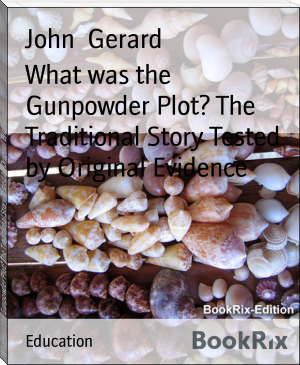What was the Gunpowder Plot? The Traditional Story Tested by Original Evidence by John Gerard (top 10 most read books in the world .TXT) 📕

Read free book «What was the Gunpowder Plot? The Traditional Story Tested by Original Evidence by John Gerard (top 10 most read books in the world .TXT) 📕» - read online or download for free at americanlibrarybooks.com
- Author: John Gerard
Read book online «What was the Gunpowder Plot? The Traditional Story Tested by Original Evidence by John Gerard (top 10 most read books in the world .TXT) 📕». Author - John Gerard
[290] I am informed on high authority that on the day in question it was high water at London Bridge between five and six p.m. In his Memorials of the Tower of London (p. 136) Lord de Ros says that the vessel destined to convey him to Flanders was to be in waiting for Faukes at the river side close by, and that in it he was to drop down the river with the ebb tide. It would, of course, have been impossible for any sea-going craft to make its way up to Westminster; nor would the ebb tide run to order.
[291] It is frequently said that the testimony of Bishop Goodman, who has been so often cited, is discredited by the fact that he probably died a Catholic, for he was attended on his death-bed by the Dominican Father, Francis à S. Clara (Christopher Davenport), chaplain to Queen Henrietta Maria, a learned man who indulged in the dream of corporate reunion between England and Rome, maintaining that the Anglican articles were in accordance with Catholic doctrine.
In his will Goodman professed that as he lived, so he died, most constant in all the articles of the Christian Faith, and in all the doctrine of God's holy Catholic and Apostolic Church, "whereof," he says, "I do acknowledge the Church of Rome to be the Mother Church. And I do verily believe that no other church hath any salvation in it, but only so far as it concurs with the faith of the Church of Rome." On this, Mr. Brewer, his editor, observes that a sound Protestant might profess as much, the question being what meaning is to be given to the terms employed. Moreover, the same writer continues, Goodman cannot have imagined that his life had been a constant profession of Roman doctrine, inasmuch as he advanced steadily from one preferment to another in the Church of England, and strongly maintaining her doctrines formally denounced those of Rome. What is certain, however, is this, that in the very work from which his evidence is quoted he speaks in such a manner as to show that whatever were his religious opinions, he was a firm believer in the Royal Supremacy and a lover of King James, whom he thus describes: "Truly I did never know any man of so great an apprehension, of so great love and affection,--a man so truly just, so free from all cruelty and pride, such a lover of the church, and one that had done so much good for the church." (Court of King James, i. 91.)
CHAPTER VII. (PERCY, CATESBY, AND TRESHAM.)
ON occasion of a notorious trial in the Star Chamber, in the year 1604,[292] Bancroft, the Archbishop of Canterbury, made the significant observation[293] that nothing was to be discovered concerning the Catholics "but by putting some Judas amongst them." That amongst the Powder Plot conspirators there was some one who played such a part, who perhaps even acted as a decoy-duck to lure the others to destruction, has always been suspected, but with sundry differences of opinion as to which of the band it was. Francis Tresham has most commonly been supposed at least to have sent the warning letter to Monteagle, which proved fatal to himself and his comrades: some writers have conjectured that he did a good deal more.[294] Monteagle himself, as we have seen, has been supposed by others to have been in the Plot and to have betrayed it. It would appear, however, that neither of these has so strong a claim to this equivocal distinction as one whose name has been scarcely mentioned hitherto in such a connection.
The part played in the conspiracy by Thomas Percy is undoubtedly very singular, and the more so when we learn something of the history and character of the man. Till within some three years previously[295] he had been a Protestant, and, moreover, unusually wild and dissolute. After his conversion, he acquired the character of a zealous, if turbulent, Catholic, and is so described, not only by Father Gerard and Father Greenway, but by himself. In a letter written so late as November 2nd, 1605,[296] he represents that he has to leave Yorkshire, being threatened by the Archbishop with arrest, "as the chief pillar of papistry in that county."
It unfortunately appears that all the time this zealous convert was a bigamist, having one wife living in the capital and another in the provinces. When his name was published in connection with the Plot, the magistrates of London arrested the one, and those of Warwickshire the other, alike reporting to the secretary what they had done, as may be seen in the State Paper Office.[297]
Gravely suspicious as such a fact must appear in connection with one professing exceptional religious fervour, it by no means stands alone. Father Greenway, in describing the character of Percy,[298] dwells much on his sensitiveness to the suspicion of having played false to his fellow Catholics in his dealings with King James in Scotland, coupled with protestations of his determination to do something to show that he as well as they had been deceived by that monarch. We find evidence that as a fact some Catholics distrusted him, as in the examination of one Cary, who, being interrogated concerning the Powder Plot, protested that "Percy was no Papist but a Puritan."[299] There is likewise in the king's own book a strange and obscure reference to Percy as the possible author of the letter to Monteagle, one of the chief grounds for suspecting him being "his backwardness in religion." It would moreover appear that he was not a man who always impressed those favourably who had to do with him, for Chamberlain reminds his friend Carleton that the latter had ever considered him "a subtle, flattering, dangerous knave."[300]
We have seen something of the extraordinary manner in which Percy transacted the business of hiring the house and "cellar," wholly unlike what we should expect from one whose main object was to escape observation, and that he brought to bear the influence of sundry Protestant gentlemen, amongst them Dudley Carleton himself,[301] in order to obtain the desired lease. We know, moreover, that various unfortunate accidents prevented the history of these negotiations from ever being fully told.
Yet more remarkable is a piece of information supplied by Bishop Goodman, his authority being the eminent lawyer Sir Francis Moore, who, says he, "is beyond all exception."[302] Moore, having occasion during the period when the Plot was in progress to be out on business late at night, and going homeward to the Middle Temple at two in the morning, "several times he met Mr. Percy coming out of the great statesman's house, and wondered what his business should be there." Such wonder was certainly not unnatural, and must be shared by us. That a man who was ostensibly the life and soul of a conspiracy directed against the king's chief minister, even more than against the sovereign himself, should resort for conference with his intended victim at an hour when he was most likely to escape observation, is assuredly not the least extraordinary feature in this strange and tangled tale.
Not less suspicious is another circumstance. Immediately before the fatal Fifth of November, Percy had been away in the north, and he returned to London only on the evening of Saturday, the 2nd. Of this return, Cecil, writing a week later,[303] made a great mystery, as though the traitor's movements had been of a most stealthy and secret character, and declared that the fact had been discovered from Faukes only with infinite difficulty, and after many denials. It happens, however, that amongst the State Papers is preserved a pass dated October 25th, issued by the Commissioners of the North, for Thomas Percy, posting to Court upon the king's especial service, and charging all mayors, sheriffs, and postmasters to provide him with three good horses all along the road.[304] It is manifestly absurd to speak of secrecy or stealth in connection with such a journey, or to pretend that the Chief Secretary of State could have any difficulty in tracing the movements of a man who travelled in this fashion; and protestations of ignorance serve only to show that to seem ignorant was thought desirable.
Considerations like these, it will hardly be denied, countenance the notion that Percy was, in King James's own phrase, a tame duck employed to catch wild ones. Against such a supposition, however, a grave objection at once presents itself. Percy was amongst the very first victims of the enterprise, being one of the four who were killed at Holbeche when the conspirators were brought to bay.
This, unquestionably, must at first sight appear to be fatal to the theory of his complicity, and the importance of such a fact should not be extenuated. At the same time, on further scrutiny, the argument which it supplies loses much of its force.
CHAPTER VIII. (THE GOVERNMENT'S CASE.)
WE have hitherto confined our attention to sources of information other than those with which the authors of the official narrative have supplied us, and upon which they based the same. It remains to inquire how far the evidence presented by them can avail to substantiate the traditional history, and to rebut the various arguments against its authenticity which have been adduced.
For brevity and clearness' sake it will be advisable to divide this investigation under several heads.
The Trial of the Conspirators.On the threshold of our inquiry we are met by a most singular and startling fact. As to what passed on the trial of the conspirators, what evidence was produced against them, how it was supported,--nay, even how the tale of their enterprise was told--we have no information upon which any reliance can be placed. One version alone has come down to us of the proceedings upon this occasion--that published "by authority"--and of this we can be sure only that it is utterly untrustworthy. It was issued under the title of the True and Perfect Relation, but, as Mr. Jardine has already told us, is certainly not deserving of the character which its title imports. "It is not true, because many occurrences on the trial are wilfully misrepresented; and it is not perfect, because the whole evidence, and many facts and circumstances which must have happened, are omitted, and incidents are inserted which could not by





Comments (0)